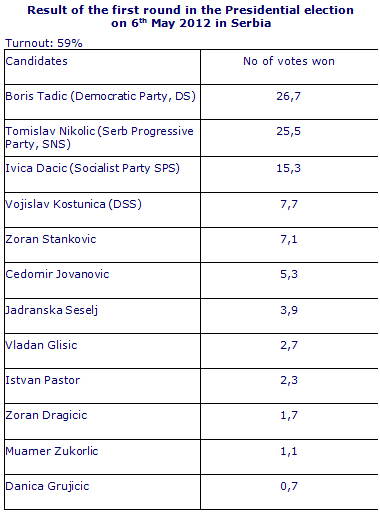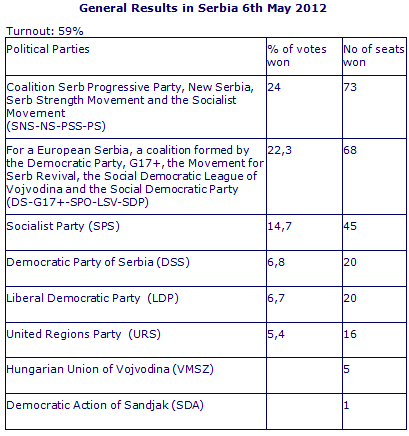News
Corinne Deloy,
Fondation Robert Schuman,
Helen Levy
-

Available versions :
EN

Corinne Deloy
Fondation Robert Schuman
Helen Levy
The two favourites in the polls came out ahead in the first round of the presidential election on 6th May in Serbia. Outgoing president of the Republic Boris Tadic (Democratic Party, DS) won 26.7% of the vote. He took the lead over Tomislav Nikolic (Serb Progressive Party SNS), who won 25.5% of the vote. Both men each won less than in the previous presidential election on 20th January 2008 – 8.9 points less for the outgoing for the outgoing head of State and 14.39 points less for his nationalist rival. Boris Tadic and Tomislav Nikolic will be facing each other in the 2nd round of the election on 20th May.
In the general elections that took place on the same day the coalition rallying the Serb Progressive Party led by Tomislav Nikolic, New Serbia led by Velimir Ilic, the Strength of Serbia Movement and the Socialist Movement (SNS-NS-PSS-PS) - came out ahead winning 24% of the vote (73 seats) whilst the Democratic Party in office won 22.3% of the vote (68 seats). The Socialist Party (SPS) led by Ivica Dacic came third with 14.7% of the vote (45 seats). It leads over the Democratic Party of Serbia (DSS) led by former Prime Minister (2004-2008) Vojislav Kostunica, (6.8%) and the U-Turn Coalition led by the Liberal Democratic Party (LDP) under Cedomir Jovanovic (6.7%) which each won 20 seats.
The United Regions Party (URS), a party in the outgoing government, won 5.4% and 16 seats; the Hungarian Union of Vojvodina (VMSZ) won five seats and Democratic Action of Sandjak (SDA), another party in the outgoing government won 1 seat.
Finally the Serb Radical Party (SRS), an ultra- nationalist party led by Dragan Todorovic failed to win 5% of the votes cast which are vital to be represented in the National Assembly, the only Chamber in Parliament.
As in the previous general election on 11th May 2008 the Socialist Party, which almost doubled its result in comparison with the previous election four years ago, finds itself in the position of kingmaker. Its leader Ivica Dacic, should, in all likelihood re-iterate his support for the Boris Tadic's Democratic Party and be given the post of Prime Minister. "We do not yet know who the next president of the Republic will be but we know who the new Prime Minister is," declared the socialist leader on the announcement of the results.
Turnout was also slightly down, two points less than that recorded in 2008, rising to approximately 59%.
"I shall face Tomislav Nikolic" said outgoing President Tadic on the announcement of the results. "Will the country be governed by those who have shamed us, those who threatened to kill hundreds of members of other nations and other religions for every one of our citizens who is killed? No, this country has to be governed by those who have international credibility," he stressed adding that "the improvement in living standards" was his strategic objective. "We shall rapidly take Serbia towards European integration and continue changes and development," he promised by saying he was confident in his victory on 20th May next.
His rival Tomislav Nikolic said he was convinced that he would win the presidential election. "It is not the first time. But this time it is for sure. Serbia is impatiently expecting vital change. Victory is close to hand," he maintained. The Progressive Party leader is promising to improve living standards of those who have "lost out in the transition over to the market economy" and to invest in agriculture and industry. He wants to raise taxes on the wealthiest and re-assess privatisations. "Even under the cover of a pro-European rhetoric Tomislav Nikolic's discourse is still oriented according to populist, nationalist tradition which is still very much alive in Serbia," analyses historian Latinka Perovic.
The two candidates in the presidential election are promising to reduce the numbers of employees in the civil service, to create jobs, to attract foreign investments and to counter corruption. "These are the first elections since 1990 in which the economy has been a focal point," stresses sociologist Srecko Mihajlovic. "The candidates have made lists of what they want to do. Neither has presented any real measures that will lead to the creation of jobs or to attract billions of euros in investments," regrets political scientist Bojan Panajotovic.
Serbia has been seriously affected by the international economic crisis. Unemployment totals 24% of the population, the black economy represents around 30% of the GDP and 7.3 million Serbs live below the poverty line. Moreover growth of 0.5% planned for 2012 is far from guaranteed. In January the IMF froze a payment of aid totalling 1.3 billion $ that had been set aside for Serbia since Belgrade had not succeeded in consolidating its public finances enough.
The second round of the presidential election on 20th May next is vital: there is a choice between continuing reform and following the path towards the EU with Boris Tadic or adopting a more social policy with Tomislav Nikolic - this is the alternative which the Serbs face.
 Source: Centre for Free Elections and Democracy (CeSID)
http://www.cesid.org/
Source: Centre for Free Elections and Democracy (CeSID)
http://www.cesid.org/
 Source: Centre for Free Elections and Democracy (CeSID)
http://www.cesid.org/
Source: Centre for Free Elections and Democracy (CeSID)
http://www.cesid.org/On the same theme
To go further
Elections in Europe
Corinne Deloy
—
20 January 2026
Elections in Europe
Corinne Deloy
—
13 January 2026
Elections in Europe
Corinne Deloy
—
4 November 2025
Elections in Europe
Corinne Deloy
—
28 October 2025

The Letter
Schuman
European news of the week
Unique in its genre, with its 200,000 subscribers and its editions in 6 languages (French, English, German, Spanish, Polish and Ukrainian), it has brought to you, for 15 years, a summary of European news, more needed now than ever
Versions :



